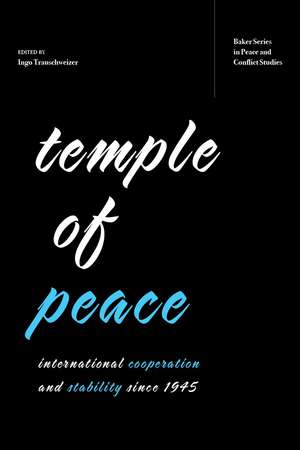Temple of Peace: International Cooperation and Stability since 1945: Baker Series in Peace and Conflict Stud
Editat de Ingo Trauschweizeren Limba Engleză Paperback – 18 feb 2022
This collection raises timely questions about peace and stability as it interrogates the past and present status of international relations. The post–World War II liberal international order, upheld by organizations such as the United Nations, the North Atlantic Treaty Organization, and similar alliances, aspired to ensure decades of collective security, economic stability, and the rule of law. All of this was a negotiated process that required compromise—and yet it did not make for a peaceful world. When Winston Churchill referred to the UN framework as “the temple of peace” in his famous 1946 Iron Curtain speech, he maintained that international alliances could help provide necessary stability so free people could prosper, both economically and politically. Though the pillars of international order remain in place today, in a world defined as much by populism as protest, leaders in the United States no longer seem inclined to serve as the indispensable power in an alliance framework that is built on shared values, human rights, and an admixture of hard and soft power. In this book, nine scholars and practitioners of diplomacy explore both the successes and the flaws of international cooperation over the past seventy years. Collectively, the authors seek to address questions about how the liberal international order was built and what challenges it has faced, as well as to offer perspectives on what could be lost in a post-American world.
Preț: 220.31 lei
Nou
Puncte Express: 330
Preț estimativ în valută:
42.17€ • 45.82$ • 35.45£
42.17€ • 45.82$ • 35.45£
Carte indisponibilă temporar
Doresc să fiu notificat când acest titlu va fi disponibil:
Se trimite...
Preluare comenzi: 021 569.72.76
Specificații
ISBN-13: 9780821424933
ISBN-10: 0821424939
Pagini: 242
Dimensiuni: 152 x 229 x 20 mm
Greutate: 0.27 kg
Editura: Ohio University Press
Colecția Ohio University Press
Seria Baker Series in Peace and Conflict Stud
ISBN-10: 0821424939
Pagini: 242
Dimensiuni: 152 x 229 x 20 mm
Greutate: 0.27 kg
Editura: Ohio University Press
Colecția Ohio University Press
Seria Baker Series in Peace and Conflict Stud
Recenzii
“As the consensus around global institutions and alliances shatters around us, this marvelous volume is a timely intervention. Trauschweizer gathers a stellar team of historians to recover the forces that produced the postwar liberal international order and to help us understand the structural and ideational challenges it faces today.”—Mark Philip Bradley, Bernadotte E. Schmitt Distinguished Service Professor of International History, University of Chicago
“An optimistic volume that concludes it is quite premature to talk about the imminent demise of the liberal postwar order. Anyone with a serious interest in global affairs will benefit from reading these inspiring contributions.”—Klaus Larres, coeditor of Understanding Global Politics: Actors and Themes in International Affairs
“At a time when the value of international organizations, including the United Nations and NATO, is increasingly questioned, the contributors present stimulating, balanced and insightful accounts of the limits and possibilities of international cooperation. A must-read for everyone who is curious about the past, present, and future of the liberal international order.”—Nukhet A. Sandal, author of Religious Leaders and Conflict Transformation: Northern Ireland and Beyond
Notă biografică
Ingo Trauschweizer is a professor of history and former director of the Contemporary History Institute at Ohio University, where he teaches courses on American and global military history, the Cold War, and the Vietnam War. His books include The Cold War U.S. Army: Building Deterrence for Limited War and Maxwell Taylor’s Cold War: From Berlin to Vietnam.
Cuprins
Introduction (INGO TRAUSCHWEIZER) 1. The New Deal as Grand Strategy: Constructing the Postwar Institutional Order (ELIZABETH BORGWARDT) 2. SACEUR as Statesman: Politico-Military Leadership in NATO, 1951–67 (SETH GIVENS) 3 Forgotten Institution: The Role of the OEEC in European Post–World War II Reconstruction and Integration (ARMIN GRÜNBACHER) 4. Shaping Australia into a Neighborhood Power: Decolonization, Vulnerability, and the Cold War (LAURA M. SEDDELMEYER) 5. A “Controlled Revolution”: The UN during the Congo Crisis as Public Stage, Actor, and Incubator for Ideas (ALANNA O’MALLEY) 6. Insurgency’s Three Waves (STEVEN METZ) 7. The Ability to Adapt: NATO’s Statecraft and Europe’s Transformation, 1966–94 (STEPHAN KIENINGER) 8. Russia and the Erosion of the Liberal Order (JENNIFER BRUSH) 9. Erosion of the Liberal Order? (MARY NOLAN) Postscript (INGO TRAUSCHWEIZER) Index
Descriere
The often-violent realities of international relations in the post–World War II era have challenged Winston Churchill’s characterization of the United Nations as a “temple of peace.” In this volume, nine experts examine the modern history of international relations in order to shed light on their prospective futures.



